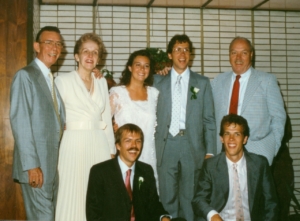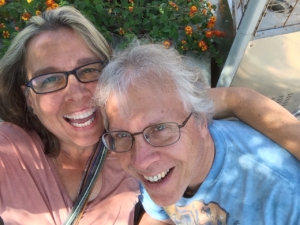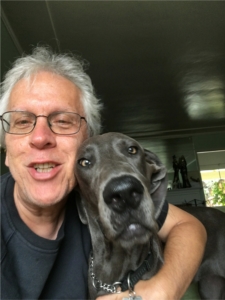And God Said: “Come as You Are”
When I was five, I turned away from God. I don’t remember the date, but I do remember the day. It was cold and blustery, a dark Sunday morning in Glen Ridge, New Jersey. I remember the harsh stone wall of the church, the big medieval wooden door, the slate walk leading up to it. The coldness of it all pierced me. My brother and I had spent our earliest years hiding from my father and his alcoholic rage. Physical violence in our home was normal during that time, and I reacted to it in the most rational way I could, by making myself as invisible as possible, physically and emotionally. But then, when I was almost six, another brother was born, and something changed. We moved from all white, conservative Glen Ridge, to Montclair, a progressive, multicultural town. Later, my parents told me the reason we moved was because, “There are a lot of different kinds of people in the world, and you’re going to need to learn how to live with them.” So, while that was true, and growing up in Montclair has proved to be an invaluable gift in terms of my ability to function in the world, I think the move also served as a new beginning for all of us. After we moved, my father never beat any of us again.
However, our lives before Montclair set up a long and difficult conflict with God. A fundamental trust had been broken in my family. I knew my parents loved me, but I couldn’t trust them because of their alcoholism. After the move, my dad still drank, he still had fits of rage, but he was able to channel his anger elsewhere and not direct it at his children. But he also withdrew emotionally, and my mother moved into that void. She wasn’t physically violent, but she was a thinker and had no problem letting us know exactly what she was thinking about. Honestly, I don’t know which form of abuse was worse, the beatings or the meticulous scrutiny. The message I heard from her was, “This is what’s wrong with you, this is what we’re going to do to make you better, and this is how happy we’ll all be once you’re better.” She analyzed, in gruesome detail, everything we said, did, or expressed in any way.
I had a recent insight into how deeply embedded this became in me. I’ve been telling a story for thirty six years that is essentially a lie, but which I thought was true and which grew directly out of the way my mother unintentionally trained me to think. For the record, both my parents ended up getting sober, and I eventually followed them into recovery. So, the story goes that during my first year in recovery, I was going to meetings and naturally, I was meeting people. After a while, I started getting close with several different women. I would meet one of them for dinner before a meeting, on another day I might talk to one of them for an hour or two on the phone, or I might meet one of them for coffee and a walk in the park. We were all in our twenties, relatively new to recovery, and were learning how to have adult relationships. Well, one night, I had an opportunity to have sex with one of the women. I couldn’t do it. It wasn’t right. I apologized and left, later realizing that I wanted to be with one of the other women, who I ended up marrying several years later. The story I told myself, and have been telling for thirty six years, was that I was using these women to see which one was going to work out for me. And, you know what else that’s called? Dating. It’s what millions of people do to figure out if they like someone, maybe fall in love with them, and see if they can live with them. Dating. Healthy, normal behavior. But I’ve been telling myself a different story for all these years, one with a subtle and disturbed little twist, and it came straight from my mother’s alcoholic psyche.
 Keep in mind, I hold no resentment toward my parents for any of this, I have worked through that. But the effects of my childhood are still with me, and I am still getting insight into that today. And all of this directly impacted my relationship with God. As a child, I could only imagine God. The only authority I understood in my daily life was that of my parents and other adults. So, I applied that immature understanding to my relationship with God. By the time I was in my late teens, I was looking at the world around me and saw systemic oppression, a seemingly infinite variety of physical, emotional, spiritual, and economic violence, and a fundamental lack of demonstrated compassion for others. I couldn’t reconcile the violence in my family or in the world with the idea of a loving God that I might have a personal relationship with. I was trapped in a space where I believed in God but couldn’t trust God.
Keep in mind, I hold no resentment toward my parents for any of this, I have worked through that. But the effects of my childhood are still with me, and I am still getting insight into that today. And all of this directly impacted my relationship with God. As a child, I could only imagine God. The only authority I understood in my daily life was that of my parents and other adults. So, I applied that immature understanding to my relationship with God. By the time I was in my late teens, I was looking at the world around me and saw systemic oppression, a seemingly infinite variety of physical, emotional, spiritual, and economic violence, and a fundamental lack of demonstrated compassion for others. I couldn’t reconcile the violence in my family or in the world with the idea of a loving God that I might have a personal relationship with. I was trapped in a space where I believed in God but couldn’t trust God.
In addition, family life presented challenges besides alcoholism. My father’s family was Irish Catholic, my mothers was Scottish Protestant. That can be a volatile combination. My father’s family denied it, but my mother said that for years into their marriage, she experienced a lot of animosity from them because of her heritage. One time, when I was in my early teens, we were sitting around watching the news on television, my mother, my father, and me. My dad had just gotten home from work and seemed to be enjoying his whiskey sour, and my mom was drinking something similar. It was a pleasant evening until, at one point, she made a comment that Billy Graham was bigger than the Pope. I thought my father was going to kill her. For some reason she thought his rage was funny, but I was terrified by it. I remember him rocketing out of his chair, shouting at her, right in her face, and her laughing hysterically right back at him. To me, it was another in a long number of lessons in staying quiet and keeping a low profile. Into my early teens, I had been active in our church, but this was another example of how there were no safe places in the world. Religious conflict became a staple in our family, which continues to this day. One of my brothers and I have an agreement, half in jest, half real, that we can talk about religion once every five years. I don’t have an active relationship with my other brother, in part because of differences in our relationship with God.
In my late teens I dove into heavy drug and alcohol abuse. That went on for ten years. During that time, I moved to California, got a bachelor’s degree at UC Santa Barbara, and moved to Los Angeles for a job with a big time law firm. The move to Los Angeles was difficult. My girlfriend from college had moved up to the Bay Area to live with her parents. My youngest brother had come out to live with me, but that only lasted a few months. Our relationship has always been problematic. I met a few people through work and ended up sharing an apartment with one of them, and there was one guy I used to hang out with. But, in truth, I was dying of loneliness. By this time, my mother had gotten sober and had dragged my dad in behind her. He told me that for the first nine months of his sobriety he thought his name was, “Shut Up and Get in the Car.” She convinced me to go to a couple of meetings when I was in Santa Barbara and it didn’t stick: I couldn’t hear the message of hope. By the time I had gotten to Los Angeles though, I was desperate enough to try it again and finally sobered up, got involved in recovery, and have been engaged with that ever since. Life in recovery has proven to be the greatest, most amazing adventure I could have ever imagined. It has given my life a purpose and direction I never had growing up and would not trade for anything. Still, it has taken a long time to rebuild that childish faith I believe we are all born with, that I hear in the laughter of infants who have not yet seen the darker side of life.
I never gave up my quest for a meaningful relationship with God, even before I got sober. It’s just that I needed a practical application, one I could take into my everyday life. That has taken many years to build, largely through my work in recovery, but it is something I have been able to realize. I’ve attended different churches from time to time over the years, been involved with volunteer activities in the community, and read what seems like a thousand books on God, spirituality, and religion. But it is through my experience in recovery that I was able to make a personal connection. I realized I had grafted my experience with my parents onto my relationship with God, that is, I knew they loved me, I just couldn’t trust them because of the alcoholism.
Besides the experience of getting sober in the first place, the most fundamental change in my relationship with God came after I’d been in recovery over fifteen years. It became apparent that my wife and I weren’t going to be able to have children. She had medical problems that required several surgeries and all kinds of treatments. The net result was we were ruined financially and had no children to show for it. One day, I was going to a meeting, wondering how we were going to dig ourselves out of the cruel hole we’d found ourselves in. I was growing in awareness that I needed a God that would take me just as I was in a way that I could understand and accept. I needed a come as you are kind of God. My prayer that day was, “Fuck you, fix this.” After the meeting, I picked up a message from a guy I was helping through early recovery. He had gone on a drug binge and was in bad shape. He asked if I could bring him some food and sit for a while, which I was happy to do. A couple of weeks later, the same situation happened. I said the same basic prayer, another newish guy called me asking for some help, I went to see him. Not long after that, I realized my prayer had been answered. God had fixed my problem by directing me into service for a fellow who needed help, the same kind of help I needed when I was new in recovery. My life was given new meaning by providing me with a greater sense of how service more deeply enriches my own well being. It was so simple I had almost missed it.
 What I came to see was that all my prayers are answered. Every time. I don’t always hear it, and I’m not always willing to do what I feel directed to, but that Love is always present, always available, always ready. This experience also helped me in healing from the heartbreak of not being able to have children. Rather than caring for my own kids, I have been able to take that energy and direct it into my work, not only in the recovery community, but in the larger world through volunteer activities such as job skills training for veterans and others, progressive political campaigning, and college prep for disadvantaged teens.
What I came to see was that all my prayers are answered. Every time. I don’t always hear it, and I’m not always willing to do what I feel directed to, but that Love is always present, always available, always ready. This experience also helped me in healing from the heartbreak of not being able to have children. Rather than caring for my own kids, I have been able to take that energy and direct it into my work, not only in the recovery community, but in the larger world through volunteer activities such as job skills training for veterans and others, progressive political campaigning, and college prep for disadvantaged teens.
Having this very personal, very intimate connection has allowed me to come to terms with, among other things, the violence in my family and in the world. That doesn’t mean I approve of violence, but I am able to accept it. I was able to see that my parents were, in fact, loving, giving people, who also had problems, all at the same time. I was able to separate them from the disease of alcoholism and see the people underneath, their true selves. In the same way, I can see that much, if not all, of the violence in the world is driven by fear, in one form or another. The Bible defines this by saying the love of money is the root of all evil. That is, we look for physical solutions for the emotional problem of fear. Those physical solutions typically focus on money and violence, but can also include things like drugs and alcohol, relationships, sex, and other similar manifestations. On their own, some of these are normal and healthy, but when we use them to address our fear, it causes trouble. Seeing how this operated in my parents and others in recovery enabled me to see how it similarly operates in the world. Violence still disgusts and terrifies me, but I am better able to take an objective view, which then allows me to look for solutions rather than wallow in blame.
The problems I had when I was six are still a part of me, but I have tools and experience I didn’t have then. The real problem wasn’t whether or not I could trust my parents, or God, it was whether or not I could trust myself. I lived a lifetime blinded by my own fear, only to find that fear is just information. It provides me with knowledge I need about myself and the world around me, but that is all it is, information. I have found that when I make decisions based on my fear, that is what I’m going to get back from the world. The spiritual tools I have learned give me a way to look at my fear objectively and then make conscious choices about how I want to live. When I honor that, I live in a state of trust within myself, which makes life a lot easier to manage. It also gives me a way to see the past, and the present, in a new light. It enables me to embrace the pain and use it as a bridge of empathy and compassion to help others through their troubles. And it helps me to see the love my parents did provide me, the good times I had with them, and the joy I am able to experience because of that. Through that foundational awareness, I am able to trust God within, the God in which I live and breathe, and so wander the Earth in this great adventure we all share.
Robert Kirwin is a writer and multi-dimensional human with an MFA in Creative Writing from Antioch University, Los Angeles. The first draft of his first novel is waiting for him to start on the second draft. He has been rejected by some of the most prestigious publications in the world and continues to submit work wherever and whenever he can. He lives in Los Angeles, CA with his tolerant wife, their dog, and two cats who keep a watchful eye on everything.





